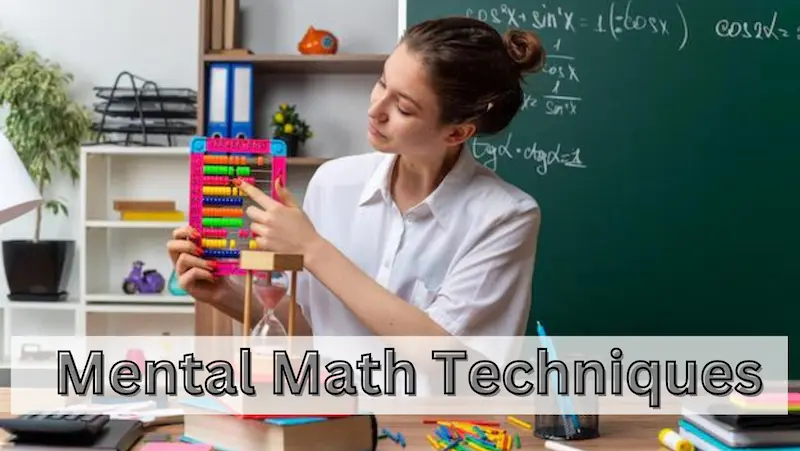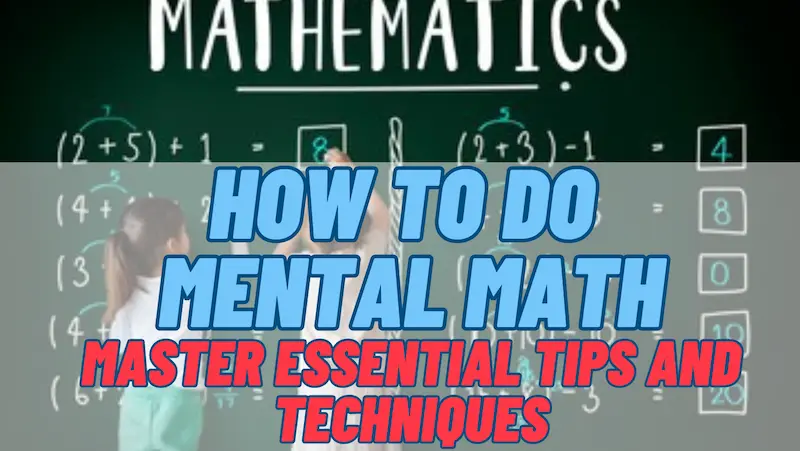How to do Mental Math: Mental math is an invaluable skill that goes beyond the classroom, empowering individuals to calculate swiftly, make sound decisions, and boost their overall cognitive abilities. Whether you’re splitting a restaurant bill, estimating expenses, or impressing friends with your mathematical prowess, mastering mental math can enhance your everyday life. In this comprehensive guide, we will explore the fascinating realm of mental math, unveiling the secrets behind rapid calculations and equipping you with practical tips, tricks, and techniques that are accessible to all. Prepare to sharpen your mental acuity and discover the joy of becoming a math wizard!
The Importance of Mental Math
Mental math is often underestimated in its significance, relegated to the realm of school assignments or academic competitions. However, its importance extends far beyond solving math problems in a classroom. Mental math is, in essence, a cognitive exercise that nurtures and strengthens the human mind.
First and foremost, mental math enhances memory retention. When we perform calculations mentally, we rely on our brain’s capacity to store and recall numbers and operations. This continual exercise of memory is akin to a mental workout, which not only helps us remember mathematical concepts but also boosts our overall ability to retain information. This enhanced memory can have far-reaching implications in various aspects of life, from studying for exams to remembering crucial details in professional settings.
Furthermore, mental math improves concentration and focus. When we engage in mental calculations, we need to concentrate solely on the task at hand, eliminating distractions. This sharpened focus is not limited to mathematics; it can be applied to any task or problem-solving situation. Improved concentration is particularly beneficial in today’s fast-paced world, where distractions abound, and multitasking is the norm.
Another compelling reason to embrace mental math is its role in enhancing critical thinking skills. Mental math requires us to analyze problems, identify patterns, and develop strategies for efficient solutions. These cognitive processes are not limited to mathematics; they translate into better decision-making, problem-solving, and analytical abilities in various aspects of life.
Moreover, studies have shown that regular practice of mental math can lead to better math grades for students. It instills confidence and a deeper understanding of mathematical concepts, making complex problems more approachable. For professionals, mental math equips them with the ability to make quick, accurate calculations without relying on external tools or devices, enhancing efficiency and productivity.
In essence, the importance of mental math lies in its multifaceted benefits for memory, concentration, critical thinking, education, and professional life. It is a skill that transcends the boundaries of mathematics, enriching our cognitive abilities and empowering us to excel in a multitude of life’s challenges.
Building a Strong Foundation


When it comes to mastering mental math, building a strong foundation is akin to laying the cornerstone of a sturdy structure. It serves as the basis upon which all future mathematical skills will be developed.
At its core, a strong foundation in mental math involves a deep understanding of basic mathematical operations—addition, subtraction, multiplication, and division. These fundamental operations are the building blocks of more complex calculations. Students who grasp these concepts with confidence can progress to tackle more advanced mathematical challenges.
One of the primary advantages of establishing this firm groundwork is speed. The ability to perform basic calculations quickly and accurately is a valuable skill in everyday life. Whether it’s calculating expenses, splitting a restaurant bill, or determining sale prices while shopping, mental math can save time and provide a sense of empowerment.
Moreover, a solid foundation in mental math cultivates mathematical fluency. It enables individuals to think on their feet, mentally estimating and approximating solutions. This fluency extends to problem-solving in various disciplines, not just mathematics.
Building a strong foundation is especially crucial for students. It fosters a sense of confidence in math classes, as students equipped with mental math skills often find it easier to grasp more advanced topics. It also allows students to focus on understanding mathematical concepts rather than getting bogged down by tedious calculations.
Additionally, mental math enhances critical thinking. By mentally working through problems, individuals learn to approach challenges logically and analytically. They develop problem-solving strategies and learn to recognize patterns—a skill set valuable beyond the realm of mathematics.
Mental Math Techniques: Unlocking the Power Within


Mental math techniques form the heart and soul of effective mental calculation. These strategies empower individuals to perform complex mathematical operations with ease, relying solely on the power of their minds. Let’s explore some key mental math techniques that can help you unlock your mathematical potential.
Number Splitting: One powerful technique is breaking down numbers into smaller, more manageable components. For example, when multiplying 47 by 8, you can split 47 into 40 and 7, then multiply each part separately (40 x 8 = 320 and 7 x 8 = 56), and finally add the results (320 + 56 = 376). This approach simplifies calculations and reduces the risk of errors.
Round Numbers: Rounding can make calculations much quicker. For instance, when calculating 18% of 75, you can round 18% to 20% and 75 to 100. Then, mentally find 20% of 100, which is 20, and adjust it back to 18% by reducing it slightly. The result is 18.
Estimation: Estimation involves approximating numbers to simplify calculations. For instance, instead of calculating the exact product of 37 and 28, you can round both numbers to 40 and 30, respectively. Then, multiply these rounded numbers (40 x 30 = 1200) and adjust for the rounding. The estimated product is close to the actual result, saving time and effort.
Visualization: Some individuals find it helpful to visualize numbers and calculations. They might mentally draw diagrams or use mental images to represent mathematical concepts. Visualization can make abstract mathematical ideas more tangible and easier to work with mentally.
Patterns and Shortcuts: Recognizing patterns and shortcuts can significantly speed up mental math. For example, when multiplying any number by 9, you can use a pattern where the tens place decreases by 1, and the ones place increases by 1. So, 9 x 7 is 63 (tens place 6, ones place 3).
Practice and Repetition: Like any skill, mental math techniques improve with practice. Regularly challenging yourself with mental math exercises, puzzles, or even real-life calculations can enhance your proficiency.
Mental Math Apps and Resources: In the digital age, numerous apps and online resources offer interactive mental math exercises and tutorials. These tools can help you refine your skills and track your progress.
Mental math techniques are not just about solving equations but also about nurturing problem-solving abilities, enhancing concentration, and boosting confidence. By incorporating these techniques into your mathematical journey, you’ll find that complex calculations become manageable, and mathematical fluency becomes a valuable asset in both academic and everyday scenarios.
Practice Makes Perfect: The Key to Mastering Mental Math


The saying “practice makes perfect” holds particularly true when it comes to mastering mental math. Just as athletes hone their skills through regular training and musicians achieve virtuosity through hours of practice, mental math proficiency requires consistent and deliberate effort. Let’s delve into the significance of practice in becoming a mental math expert.
Enhancing Speed and Accuracy: Mental math is all about swift and precise calculations. Regular practice sharpens your mental faculties, allowing you to perform calculations quickly and accurately. As you tackle more problems, you’ll notice a significant improvement in your response time.
Boosting Confidence: Proficiency in mental math bolsters your self-assurance in your mathematical abilities. With each successfully solved problem, your confidence grows. This newfound confidence can extend beyond mathematics, positively influencing your problem-solving skills in various aspects of life.
Developing Mental Agility: Mental math is a workout for your brain. It requires mental agility, adaptability, and the ability to think on your feet. Engaging in regular mental math exercises challenges your mind, promoting cognitive flexibility and problem-solving prowess.
Real-World Application: Mental math is not just an academic skill; it’s a practical one. Everyday scenarios, such as budgeting, calculating discounts, or determining tips, benefit from strong mental math abilities. The more you practice, the more you’ll find yourself effortlessly applying these skills in your daily life.
Deepening Understanding: Repeatedly working through mental math problems allows you to internalize mathematical concepts. You begin to grasp the underlying patterns and relationships between numbers, making math more intuitive and less intimidating.
Adaptive Learning: Tailoring your practice to focus on areas where you struggle can lead to significant improvements. If you find multiplication challenging, dedicate more practice time to it. As you conquer your weaknesses, you’ll become a more well-rounded mental math practitioner.
Tracking Progress: Keeping a record of your progress can be motivating. You can measure your improvement by noting how quickly and accurately you solve problems over time. This tangible evidence of your growth serves as a powerful incentive to continue practicing.
Incorporating Technology: The digital age offers an array of mental math apps, websites, and resources designed to facilitate practice. These tools provide a structured and engaging way to reinforce your mental math skills.
Speed and Accuracy: The Cornerstones of Effective Mental Math


When it comes to mastering mental math, two essential pillars stand tall: speed and accuracy. These elements are the bedrock upon which your mental math proficiency is built. Let’s explore why speed and accuracy are critical and how you can cultivate them effectively.
Speed: The Need for Swift Calculations
In the realm of mental math, speed is of the essence. It’s about performing calculations rapidly without sacrificing accuracy. Here’s why speed matters:
Real-World Relevance: In daily life, you often encounter situations that demand quick calculations. Whether you’re calculating change at a store, estimating travel time, or deciphering time-sensitive information, being able to compute swiftly is invaluable.
Academic Advantage: In academic settings, timed tests and examinations are commonplace. Speedy mental math skills can give you a significant edge. You can complete problems faster, giving you more time for complex questions or revision.
Confidence Booster: Speedy calculations boost your confidence. As you tackle problems swiftly, you’ll feel more in control of mathematical challenges. This confidence can extend to other aspects of your life, fostering a can-do attitude.
Accuracy: The Bedrock of Reliability
While speed is crucial, it should never compromise accuracy. Here’s why precision is equally important:
Error Minimization: Accurate mental math minimizes errors. A minor miscalculation can have significant consequences, especially in fields like finance or science, where precision is paramount.
Confidence Enhancement: Accurate calculations build trust in your abilities. Knowing that your mental math results are reliable bolsters your self-assurance.
Learning Facilitation: Accuracy aids understanding. When you’re consistently correct in your mental math exercises, you’re reinforcing correct mathematical concepts and relationships.
Cultivating Speed and Accuracy
So, how can you develop and balance these two critical aspects of mental math effectively?
Practice with Purpose: Dedicate specific practice sessions to speed. Time yourself as you work through problems to gradually increase your pace. For accuracy, focus on getting the correct answer first, then work on speeding up.
Mental Drills: Engage in mental math drills that challenge both speed and accuracy. Start with simple problems and gradually progress to more complex calculations.
Review and Reflect: After each practice session, review your work. Identify areas where errors occurred and work on those specific types of problems.
Mindful Breathing: Deep, focused breathing can enhance both speed and accuracy. It calms your mind, allowing you to think clearly and act swiftly.
Use Technology Wisely: Utilize apps and online resources designed for mental math practice. Many of these tools offer timed exercises to help improve speed.
Real-Life Applications: Where Mental Math Truly Shines
Mental math isn’t just a theoretical exercise or a school subject; it’s a skill with profound real-life applications that can simplify daily tasks, enhance problem-solving abilities, and even save time and money. In this section, we’ll delve into the diverse and practical ways in which mental math shines in our everyday lives.
1. Financial Mastery: Budgeting and Money Management
One of the most tangible applications of mental math is in the realm of personal finance. Whether you’re budgeting for your monthly expenses, calculating discounts and sales tax while shopping, or determining interest rates on loans, mental math plays a pivotal role.
Imagine being at the grocery store and quickly assessing which product offers the best price per unit, or mentally calculating the total cost of your items before reaching the checkout counter. These abilities can save you money and make financial decisions more informed.
2. Time Management: Efficiency in Daily Life
Time is a precious resource, and mental math can help you manage it efficiently. For instance, estimating travel times, planning your daily schedule, or even calculating cooking times for a recipe can be done swiftly and accurately with mental math.
In a world where multitasking and time-sensitive tasks are the norm, mental math can be a game-changer. It allows you to make on-the-spot decisions, allocate your time wisely, and meet deadlines effectively.
3. Problem Solving: Thinking on Your Feet
Many real-life situations require quick problem-solving, from splitting a restaurant bill among friends to making decisions in emergency situations. Mental math equips you with the ability to think on your feet and arrive at solutions promptly.
Consider scenarios like adjusting recipes, managing travel itineraries, or optimizing your daily commute. Mental math empowers you to adapt and make informed choices swiftly.
4. Professional Advantages: Career and Education
In both academic and professional settings, mental math can provide a competitive edge. Timed tests, assessments, and even interviews may involve mental math challenges. Being proficient in mental math can boost your confidence and performance in these situations.
Whether you’re an engineer, scientist, financial analyst, or educator, mental math enhances your problem-solving capabilities and streamlines your decision-making processes.
5. Enhanced Cognitive Skills: A Lifelong Asset
Beyond its immediate practical applications, mental math has long-term cognitive benefits. Regular mental math practice sharpens your mind, enhances memory, and improves focus and concentration. These skills are invaluable in all aspects of life.
Mastering Mental Math Challenges: The Path to Excellence
Mental math challenges, often seen as intimidating or daunting, are actually opportunities for growth, learning, and mastery. In this section, we will explore how to approach and conquer these challenges, turning them into stepping stones on your journey to mastering mental math.
1. Start with the Basics: Building a Strong Foundation
To master mental math challenges, begin with a solid understanding of fundamental concepts like addition, subtraction, multiplication, and division. These are the building blocks upon which more complex calculations are based. Ensure you have a firm grasp of these basics before moving on to more advanced challenges.
2. Practice Regularly: Sharpen Your Skills
Like any skill, mental math improves with practice. Dedicate time each day to work on mental math exercises and challenges. Begin with simpler problems and gradually increase the complexity as your confidence grows. Online resources, math apps, and books can provide a wealth of exercises to enhance your skills.
3. Break Down Problems: Divide and Conquer
When faced with a complex mental math challenge, break it down into smaller, manageable steps. For example, when calculating percentages, first find ten percent and then multiply or divide as needed. This approach simplifies the task and reduces the chance of errors.
4. Develop Mental Tricks: Handy Techniques
Over time, you’ll develop mental tricks and techniques to tackle specific challenges more efficiently. For instance, to square a two-digit number ending in 5 (e.g., 25 or 45), simply multiply the tens digit by itself plus 1, and then append 25. So, for 25, it becomes (2 x 3) with 25, resulting in 625. These tricks can significantly speed up your calculations.
5. Embrace Challenges: Step Out of Your Comfort Zone
Don’t shy away from challenging mental math problems. Embrace them as opportunities to grow. Test your abilities with problems that push your boundaries. When you encounter a problem you can’t solve immediately, approach it as a puzzle to be unraveled. This mindset shift can make tackling challenges more enjoyable.
6. Learn from Mistakes: Every Error is a Lesson
Mistakes are a natural part of the learning process. When you encounter errors, view them as valuable lessons. Analyze where you went wrong, understand the correct approach, and apply this knowledge to future challenges. Overcoming mistakes is a crucial aspect of mastering mental math.
7. Seek Guidance: Learn from Experts
Consider seeking guidance from experts or experienced mentors in mental math. They can provide insights, tips, and advanced techniques that may not be readily available through self-study. Books, courses, or online communities dedicated to mental math can be excellent resources.
8. Stay Persistent: The Key to Mastery
Finally, remember that mastery takes time and persistence. Mental math challenges are meant to stretch your abilities and take you out of your comfort zone. With consistent practice, patience, and a positive attitude, you can conquer even the most formidable mental math challenges.
Conclusion:
Your journey to master mental math is an investment in your cognitive development and problem-solving abilities. Practice is the key to honing your skills and gaining confidence. Mental math equips you with the tools to swiftly tackle problems, make informed decisions, and cultivate a sharper mind. Embrace this opportunity to delve into the captivating world of mental math, unlocking your innate potential to calculate like a pro. Prepare to dazzle yourself and those around you with your newfound mastery of mental math, a skill that will serve you well in countless aspects of life!

